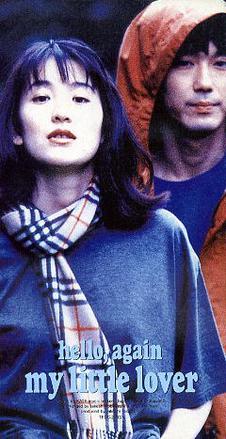
The discography of Mika Nakashima includes 11 studio albums, 7 compilation albums, 45 singles and 20 video albums. These have all been released through Sony Music Entertainment Japan.
The solo discography of Japanese musician Yui consists of five studio albums, three compilation albums, twenty-one singles and five video albums. These were released on independent label Leaflet Records in 2004, followed by Sony Music Entertainment Japan sub-label Gr8! Records in 2005, Sony Records between 2005 and 2006, Sony sub-label Studioseven Recordings between 2007 and 2010, before returning to Gr8! Records in 2010.
The discography of Ayaka consists of six studio albums, two compilation albums, a cover album and numerous singles, released through Warner between 2006 and 2009, and through Ayaka's independent label, A Station, from 2012 onwards.

Kana Nishino is a Japanese singer and songwriter signed with SME Records' Newcome Inc. She debuted on February 20, 2008 with the single "I."
The discography of Japanese contemporary R&B singer and Thelma Aoyama consists of seven studio albums, six compilation albums, one extended play, one remix album, one cover album, two video albums and numerous solo and collaboration singles. Aoyama debuted as a musician in 2007 under Universal Music Japan, and became famous through her collaboration song with rapper SoulJa, "Koko ni Iru yo". Aoyama's version "Soba ni Iru ne" became one of the most successful songs of all time in Japan, certified for three million ringtone downloads and three million downloads by the RIAJ.

"Dear…/Maybe" is a double A-side released by Japanese pop and R&B singer-songwriter Kana Nishino. It was released on December 2, 2009, by her record label SME Records. "Dear..." was written and composed by Nishino, Giorgio Cancemi and Shinquo Ogura, while "Maybe" was written and composed by Nishino and Cancemi. Musically, "Dear..." is a pop ballad influenced by R&B music, while "Maybe" is an upbeat synthpop song. Both tracks were used to promote NTT Docomo's "Ganbare Jikkou '09-'10" campaign and Maybelline New York, respectively.

"Motto…" is the seventh single released by Japanese pop and R&B singer-songwriter Kana Nishino. It was released on October 21, 2009, by her record label SME Records as the lead single to her sophomore album To Love. The title track was used as a commercial song for Recochoku and the Nippon TV dorama Detective M's theme song. It was written by Nishino, while production was handled by Giorgio Cancemi. Musically, the song is an R&B pop ballad that lyrically speaks on the bittersweet feelings of love that come with youth.

"Kimi ni Aitaku Naru Kara" is the sixth single released by Japanese pop and R&B singer-songwriter Kana Nishino. It was released on June 3, 2009, by her record label SME Records. The song was written by Nishino and Kanako Kato and composed by Nishino, Jeff Miyahara and Kenji "JINO" Hino; this single marked the first time that Nishino herself has been involved in composing a song. It was used as the commercial song for Recochoku.

"Best Friend" is a song by Japanese singer-songwriter Kana Nishino. It was released as a single on February 24, 2010 by her record label SME Records.

"Aitakute Aitakute" is a song by Japanese pop singer Kana Nishino. It was released as her 10th single on May 19, 2010. The song is produced by Giorgio Cancemi, writer of many of Nishino's hit songs. The B-side "Love Is Blind" is produced by contemporary R&B producer Hiro. Hiro produced "One Way Love," the B-side to Nishino's previous single "Best Friend."
SoulJa is a Japanese hip-hop musician and songwriter best known for his collaborations with singer Thelma Aoyama, "Koko ni Iru yo" and "Soba ni Iru ne" – the latter of which was the former Guinness World Records holder for the best selling digital single of all-time in Japan.
Lil'B is a Japanese female pop duo, consisting of singer Mie and rapper Aila. They debuted in 2008 with "Orange," the 15th ending theme song for the anime Bleach. They are best known for their song "Kimi ni Utatta Love Song," which topped the RIAJ's monthly ringtone chart in 2008. They are also well known for their single "Tsunaida Te", which was the 3rd ending theme song for the anime Fullmetal Alchemist: Brotherhood.

"If" is a song by Japanese pop singer Kana Nishino. It was released as her 11th single on August 4, 2010. The song was given the working name "I Swear" before its release. In initial promotional material about the single, it was described as a mellow medium tempo ballad, written about "a meeting with fate."

"Ring a Ding Dong" is Japanese musician Kaela Kimura's 16th physical single, released on June 9, 2010. The song was used in a wide-scale commercial campaign for NTT DoCoMo, which featured Kimura in the commercials.

"Hello, Again " is a song by Japanese band My Little Lover. It was released as a single on August 21, 1995, and is currently the band's biggest hit single.

"Kimi tte" is a song by Japanese pop singer Kana Nishino. It was released as her 12th single on November 3, 2010. The song was marketed as a "heart-warming tender" mid-tempo ballad in the initial press release, also describing the lyrics, as being about "scaling up passion to love."

"Ai o Komete Hanataba o" is a song by Japanese pop-rock act Superfly. Used as Edison no Haha's theme song, "Ai o Komete Hanataba o" was released as the band's fourth single on February 27, 2008. The song was Superfly's break-through single, breaking into the Oricon physical singles chart's top 20. As of 2011, it is Superfly's most successful single, being certified as a million ringtone download, triple platinum as a cellphone download, and single platinum for digital sales.
The discography of Monkey Majik consists of thirteen studio albums, five compilation albums and numerous singles and digital downloads. The band's releases were originally self-released in Sendai, after which they were signed to independent label and management Under Horse Records, and released material through there between 2004 and 2005. In 2005, Monkey Majik were signed to major label Avex Entertainment, and continue to release under the Binyl Records sub-label.
The discography of Tokyo Jihen consists of five studio albums, three compilation albums, one regular release extended play, three vinyl exclusive extended plays, and 13 video releases, released through Toshiba EMI, EMI Music Japan and Universal between 2004 and 2013.
The discography of Japanese pop singer Kana Nishino consists of seven studio albums, six compilation albums, thirty-four singles and ten video albums. Nishino debuted in 2008 under Sony Music Japan, and gained national recognition with the singles "Tōkutemo" and "Kimi ni Aitaku Naru Kara" (2009). Nishino has released some of the most digitally successful songs in Japan: "Motto..." (2009), "Dear..." (2009), "Best Friend" (2010), "Aitakute Aitakute" (2010), "If" (2010) and "Kimi tte" (2010), all of which were certified million by the RIAJ.



![[namie amuro 25th ANNIVERSARY LIVE in OKINAWA] .jpg](http://upload.wikimedia.org/wikipedia/commons/thumb/4/4d/%E3%80%8Cnamie_amuro_25th_ANNIVERSARY_LIVE_in_OKINAWA%E3%80%8D.jpg/140px-%E3%80%8Cnamie_amuro_25th_ANNIVERSARY_LIVE_in_OKINAWA%E3%80%8D.jpg)












